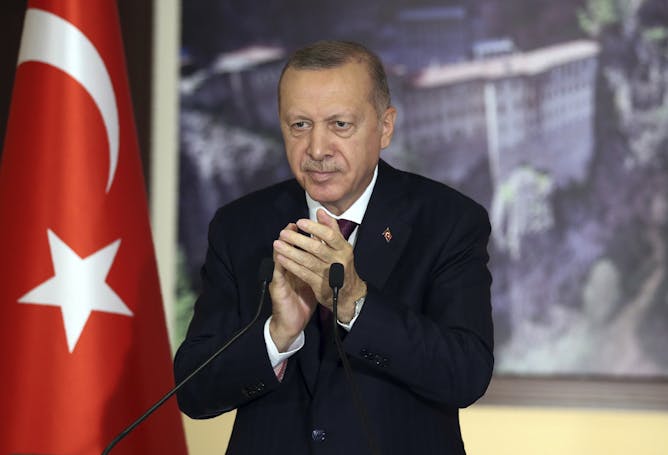|
Rukmini Callimachi’s podcast Caliphate was a major production for the New York Times. It followed the story of Shehroze Chaudhry, a 25-year-old living in Burlington, Ont. Chaudhry claimed he was an executioner for the Islamic State, and went by the name of Abu Huzayfah. In a series of interviews, Chaudhry provided Callimachi with lurid details of his time with ISIS, providing the backbone for a compelling narrative that provided a different perspective on the atrocities.
But in late September, the RCMP released a statement that they had “arrested and charged an individual today in connection with a hoax regarding terrorist activity.” The individual was Chaudhry, and this was not the first time that his claims had been questioned publicly. Today in The Conversation Canada, Fahad Ahmad from Carleton University and Tarek Younis from Middlesex University write about how the media and state agencies are invested in narratives of “bad Muslims,” and it is this investment that helped make Caliphate so
popular. The popularity of Islamophobic stories also feeds the deadly violence against Muslim people here in Canada and abroad.
Also today:
All the best.
|

An anti-Islamic protester during a demonstration at Toronto City Hall on March 4, 2017.
THE CANADIAN PRESS/Christopher Katsarov
Fahad Ahmad, Carleton University; Tarek Younis, Middlesex University
The need for security agencies and the media to view and present Islam and Muslims as constant potential threats feeds into a dangerously violent and deadly Islamophobia.
|

A Breast Cancer Awareness sign is seen before an NFL football game between the Washington Football Team and the Baltimore Ravens on Oct. 4, 2020, in Landover, Md.
(AP Photo/Susan Walsh)
Jane E. McArthur, University of Windsor
Awareness-raising alone is an ineffective solution to the breast cancer epidemic. We need more action on primary prevention to limit exposures to known and suspected breast carcinogens.
|

Pregnant women are routinely excluded from clinical trials for drugs and vaccines.
(Shutterstock)
Angela Ballantyne, National University of Singapore; Françoise Baylis, Dalhousie University
Pregnant women are at increased risk for serious COVID-19 complications and should be a high-priority group for vaccination. Excluding them from vaccine trials puts them and their offspring at risk.
|

Turkey’s President Recep Tayyip Erdogan applauds during a conference in Istanbul in July 2020 as lawmakers made speeches before voting on a bill that would give the government greater powers to regulate social media.
(Turkish Presidency via AP)
Mehmet Bastug, Lakehead University; Davut Akca, University of Saskatchewan
As Turkey reaches around the world to spy on and intimidate dissidents, new research shows Turks living in Canada are fearful and make frequent changes in how they live to protect themselves.
|

Un employé inspecte des fioles d’un vaccin contre la Covid-19 produit par SinoVac dans son usine de Pékin le 24 septembre 2020.
(AP Photo/Ng Han Guan)
Byram W. Bridle, University of Guelph; Samira Mubareka, University of Toronto; Shayan Sharif, University of Guelph
Notre exposition à un agent pathogène, que ce soit naturellement ou par la vaccination, peut affecter la manière dont notre système immunitaire réagira à l’avenir à des agents pathogènes similaires.
|
COVID-19
|
-
Nükhet Varlik, University of South Carolina
As ready as you are to be done with COVID-19, it's not going anywhere soon. A historian of disease describes how once a pathogen emerges, it's usually here to stay.
|
|
Arts
|
-
John Bryson, University of Birmingham
A government ad was slated for encouraging dancers to go into cyber security, but it actually contained a very good idea.
|
|
Business + Economy
|
-
Jenny K Rodriguez, University of Manchester; Elisabeth Anna Guenther, Vienna University of Economics and Business
Homogenous, male-only panels remain prevalent, despite growing numbers of women experts in multiple fields.
|
|